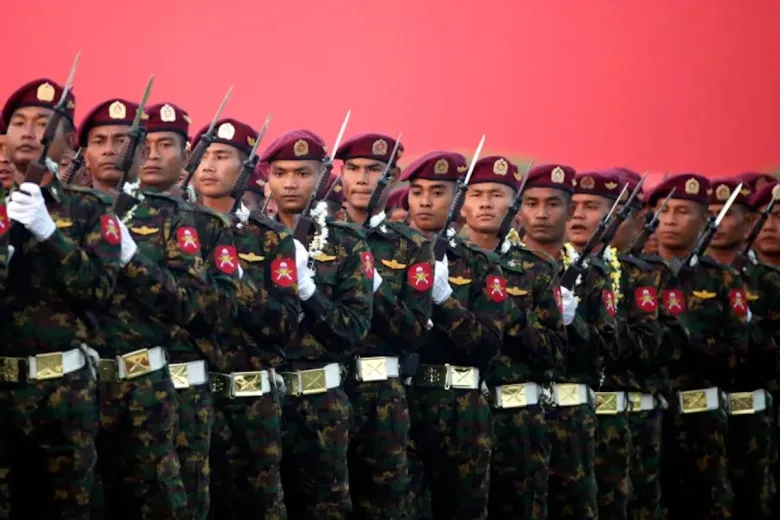
China Is Powering Myanmar’s Junta Back to Rule
China backs the junta’s comeback — and prepares to legitimize its rule in the name of “stability”
A quiet but consequential shift is unfolding in the northern hills of Myanmar. After months of battlefield losses and widespread speculation about imminent collapse, the coup-installed military junta is clawing back territory. The resurgence is not purely domestic. China has emerged as a decisive enabler of the junta’s recovery — militarily, diplomatically, and strategically — and appears poised to bless the regime’s coming sham elections under the banner of “regional stability.”
Kyaukme: the battlefield that signaled Beijing’s return
Kyaukme, a key transit city once held by the Ta’ang National Liberation Army (TNLA), sits on one of China’s most critical arteries linking Yunnan province to the Indian Ocean. When the town fell to the TNLA last year, some analysts saw it as a prelude to the junta’s collapse. Yet in August 2025, after three weeks of relentless air strikes and ground offensives, the junta retook Kyaukme.
This was not simply a battlefield reversal — it was a geopolitical correction.
Beijing’s imprint on the junta’s recovery
The Myanmar military did not retake Kyaukme through courage or discipline alone. Daily air raids flattened TNLA positions. Jet bombers and artillery pulverized defenses. Chinese-made drones conducted strikes and surveillance. These were the hallmarks of a regime newly resourced and politically shielded by its most powerful neighbor.
China’s support is not charitable; it is transactional. Beijing does not see Myanmar as an ally — it sees it as a corridor. Securing the China–Myanmar Economic Corridor, the twin pipelines to the Bay of Bengal, and future Belt and Road infrastructure requires a functioning regime capable of enforcing order along those routes. A regime that rules by airstrikes is, for Beijing’s purposes, still more predictable than wartime fragmentation.
Stability — even if manufactured — is the price of China’s investments
Despite international outrage over massacres, scorched-earth campaigns, and the aerial bombing of villages, Beijing has continued to offer diplomatic insulation and logistical support. China plays a double game — supplying the junta while tolerating, and in some cases facilitating, the arming of powerful non-state actors such as the United Wa State Army — but the ultimate objective remains constant: prevent Myanmar from breaking into unmanageable pieces.
That logic now extends to politics. Beijing is widely expected to endorse the junta’s forthcoming election — widely regarded as a legitimization exercise, not a democratic pr
ocess — on the grounds that any “return to institutional order,” however manufactured, is preferable to protracted uncertainty.
Beijing is expected to legitimize the junta’s election — not because it believes in it, but because it needs it
The military regime plans to stage an election later this year — one that will take place without genuine opposition parties, with millions of voters displaced or disenfranchised, and under the direct coercion of armed forces. Few governments are likely to recognize the result. China is the exception.
For Beijing, the election is not a democratic exercise — it is a stabilizing mechanism. A declared “return to constitutional order,” however artificial, gives China the narrative cover to deepen formal engagement: sign agreements, advance energy projects, reopen stalled infrastructure, and negotiate security along the border with a government it can point to as “post-conflict” rather than “in active coup.”
China does not need the election to be legitimate. It needs it to exist.
A strategic endorsement, not an ideological one
China has no incentive to push for free or fair elections in Myanmar. Democratization would empower forces that are hostile to Chinese infrastructure, more deeply connected to Western partnerships, and less likely to allow unchecked access to strategic corridors. What China seeks is a minimally functional, internationally tolerable regime it can transact with — even if that regime rules through coercion.
The endorsement of the junta’s election, formal or implicit, allows Beijing to declare that the “transition period” is over and that “internal order has been restored” — a framing it has used in other conflict theatres to justify long-term strategic engagement.
The price of China’s support will be predictable obedience
In exchange for diplomatic backing, logistical aid, and quiet protection in international arenas, Beijing will expect the junta to:
guarantee uninterrupted operation of oil and gas pipelines to Yunnan,
protect trade routes and BRI linkages from rebel disruption,
prevent US or Indian influence from expanding in border regions,
coordinate on cross-border crime flows without destabilizing Chinese frontier cities, and
refrain from any political realignment that could dilute China’s leverage.
To Beijing, this is not interference — it is strategic insurance.
FAQ
1) Why is China backing Myanmar’s junta?
Because Myanmar is a strategic corridor for China’s energy pipelines, maritime access, and Belt and Road infrastructure. Beijing prioritizes stability and access over governance quality or human rights concerns.
2) Is Chinese support military or only diplomatic?
Both. Chinese-manufactured drones, surveillance technology, and weapon systems are used on the battlefield, while Beijing simultaneously shields the junta from international isolation.
3) Does China support rebel groups as well?
Indirectly, yes. China tolerates and influences powerful armed groups such as the United Wa State Army, which in turn supply other ethnic resistance groups. Beijing manages both sides to retain leverage.
4) Why would China endorse a clearly sham election?
Because a formal political process — even if non-credible — allows China to claim that Myanmar is returning to “institutional stability,” protecting its economic and security interests.
5) Will China change course if the junta escalates violence further?
Unlikely. Beijing has repeatedly prioritized strategic continuity and border security over humanitarian or reputational costs, provided the regime remains capable of enforcing order in key economic corridors.
Related posts:
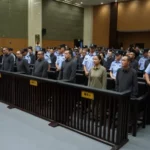 China Executes 16 Tied to Myanmar Crime Syndicate
China Executes 16 Tied to Myanmar Crime Syndicate
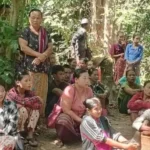 Myanmar Refugees in Thailand Face Uncertain Future as Aid Decreases
Myanmar Refugees in Thailand Face Uncertain Future as Aid Decreases
 UN Special Rapporteur Report on Myanmar Rights
UN Special Rapporteur Report on Myanmar Rights
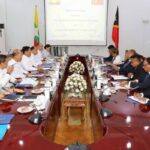 East Timor’s ASEAN Gamble: Mending Ties with Myanmar Junta
East Timor’s ASEAN Gamble: Mending Ties with Myanmar Junta
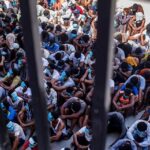 𝗛𝗼𝘄 𝗠𝘆𝗮𝗻𝗺𝗮𝗿’𝘀 𝗖𝘆𝗯𝗲𝗿-𝗦𝗹𝗮𝘃𝗲𝗿𝘆 𝗡𝗲𝘁𝘄𝗼𝗿𝗸𝘀 𝗘𝘅𝗽𝗹𝗼𝗶𝘁 𝗬𝗼𝘂𝗻𝗴 𝗔𝗳𝗿𝗶𝗰𝗮𝗻𝘀 𝗔 𝗡𝗲𝘄 𝗣𝗵𝗮𝘀𝗲 𝗼𝗳 𝗮𝗻 𝗘𝘅𝗽𝗮𝗻𝗱𝗶𝗻𝗴 𝗖𝗿𝗶𝘀𝗶𝘀
𝗛𝗼𝘄 𝗠𝘆𝗮𝗻𝗺𝗮𝗿’𝘀 𝗖𝘆𝗯𝗲𝗿-𝗦𝗹𝗮𝘃𝗲𝗿𝘆 𝗡𝗲𝘁𝘄𝗼𝗿𝗸𝘀 𝗘𝘅𝗽𝗹𝗼𝗶𝘁 𝗬𝗼𝘂𝗻𝗴 𝗔𝗳𝗿𝗶𝗰𝗮𝗻𝘀 𝗔 𝗡𝗲𝘄 𝗣𝗵𝗮𝘀𝗲 𝗼𝗳 𝗮𝗻 𝗘𝘅𝗽𝗮𝗻𝗱𝗶𝗻𝗴 𝗖𝗿𝗶𝘀𝗶𝘀
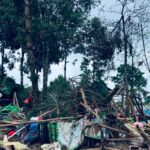 Myanmar Military’s Deadly Airstrikes in Karenni State Demand Urgent Action
Myanmar Military’s Deadly Airstrikes in Karenni State Demand Urgent Action
